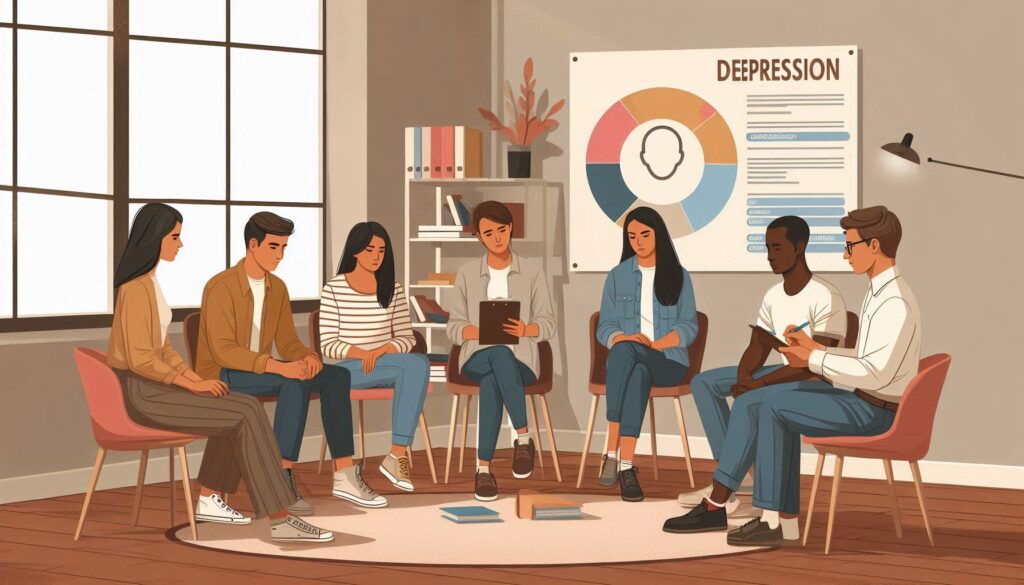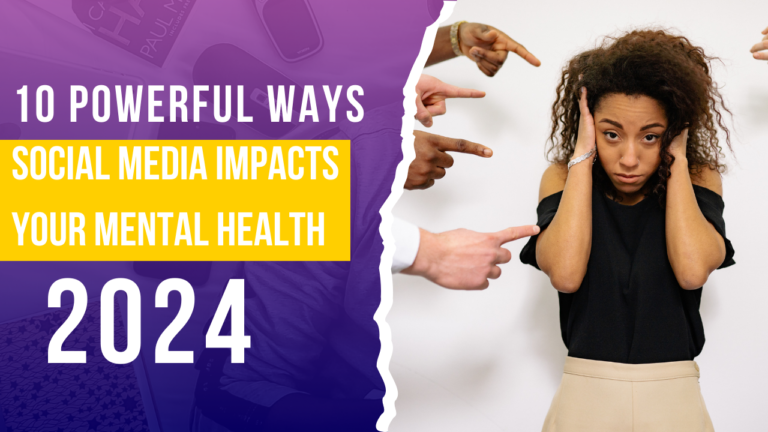Understanding the Symptoms of Depression: 7 Powerful Signs You Shouldn’t Ignore
What are the symptoms of depression?
Depression is a major depressive disorder that impacts a large number of people including of all ages, both men and women and from different cultural background. Although it is normal to have some bad days, depression is seen where a person has low moods for an extended period, this may last for weeks or even months. It is important to identify its signs to ensure that appropriate management is made at the initial stages since depression affects the quality of life of an individual.
Therefore, in this article, we will also discuss the authoritative symptoms of depression that people and their close ones should remember. This way, we know more of what people with these symptoms go through and provide them with more appreciation and compassion. Understanding these signs, if you feel them yourself or see the changes in a dear one, is the only way to turn to professionals and, thus, find hope.

Depression is a serious mood disorder that touches every part of a person’s life. Many think feeling sad now and then is the same as being depressed, but it’s more complex. Depression involves constant low mood, loss of pleasure in activities, and changes in sleep and eating habits that disrupt daily living.
This article sheds light on what symptoms to look out for.
With years spent helping individuals navigate their mental health challenges, I’ve seen firsthand how recognizing the signs of depression early can make a big difference. As someone who has walked this path with many, I’ll guide you through understanding these symptoms clearly.
Ready to learn? Let’s begin.
Key Takeaways
- Depression is a mood disorder with emotional, physical, and behavioral symptoms like feeling very sad, changes in appetite or sleep, and avoiding social activities.
- It can affect anyone at any age but is common among adults and teens in the U.S., with millions experiencing it every year.
- Different types of depression exist, including major depressive disorder and seasonal affective disorder.
- Key signs include feeling hopeless, trouble sleeping, losing interest in things once enjoyed, and having low energy.
- Seeking help from professionals through therapy or medication is important for managing symptoms. Coping strategies like exercise and talking to someone also help.
What is Depression?
Depression is a mood disorder that causes persistent sadness and loss of interest in daily activities. It can affect how you feel, think, and behave. Different types of depression exist, each with its unique characteristics and symptoms.
Definition of major depressive disorder
Major depressive disorder is a serious medical illness. It makes you feel very sad and lose interest in things you used to enjoy. People with this disorder might feel hopeless, worried, or easily irritated.
These feelings are strong and can last a long time. To have major depression, someone must have a depressed mood or not find pleasure in most activities.
This condition affects how you think and act. Children and teens may show irritability more than sadness if they have depression. The symptoms can be mild or severe but change how you handle daily life.
Now let’s explore the different types of depression that exist beyond major depressive disorder.
Different types of depression
Moving on from understanding major depressive disorder, it’s important to address the different types of depression. Depressive disorders can range from persistent depressive disorder and clinical depression to seasonal affective disorder and bipolar disorder.
Symptoms may vary, but they all generally involve persistent feelings of sadness or a lack of interest in activities once enjoyed. It’s crucial to recognize that these symptoms can significantly impact how individuals feel, think, and act daily.
For instance, seasonal affective disorder is linked to changes in seasons while bipolar disorder involves periods of high energy followed by lows.
Depression isn’t a one-size-fits-all condition; its types encompass varied experiences and challenges for those affected. These conditions often have different triggers, durations, and treatment needs tailored towards addressing their specific complexities.
Understanding the different types empowers individuals experiencing mental health issues to seek appropriate help while recognizing the diverse manifestations that depression can take on.
Who is Affected by Depression?
Depression can affect anyone, regardless of age or background. It’s a mental health condition that doesn’t discriminate and can impact people from all walks of life. Understanding who is affected by depression is key to recognizing its signs and seeking support when needed.
Statistics of those affected
Depression is common. It affects many people. About 17.3 million adults in the U.S had at least one major depressive episode in 2017. This means around 7% of all adults experience depression each year.
Depression can also impact younger people. Among adolescents aged 12-17 in the U.S., about 13% reported experiencing a major depressive episode in 2017.
These statistics show that depression is not uncommon, and it’s important to recognize the signs early for proper support and treatment.
Next, let’s talk about risk factors for developing depression.
Risk factors for developing depression
Having certain medical conditions and experiencing traumatic or stressful life events can increase the likelihood of developing depression. Medical problems such as chronic illness, insomnia, chronic pain, or attention-deficit hyperactivity disorder (ADHD) are risk factors for depression.
Similarly, facing trauma like physical or emotional abuse, death of a loved one, or financial difficulties can also heighten the chances of developing depression. It’s important to recognize these risk factors and seek help if you’re experiencing any symptoms associated with depression.
Common Symptoms of Depression
Depression can show up in different ways for different people, including emotional, physical, and behavioral symptoms. Identifying these signs is crucial for seeking help and managing the condition effectively.
Emotional symptoms
Feeling very sad, hopeless or worried is a symptom of depression. Not enjoying things that used to bring joy is also a sign of depression. One of the main symptoms must be a depressed mood or a loss of interest or pleasure in most activities.
Feeling easily irritated or frustrated can be another emotional symptom. Children and teens experiencing depression might be irritable rather than sad. Symptoms can range from mild to severe, affecting how a person feels and thinks.
Depression negatively influences how feelings, thoughts, and actions are processed by an individual. It’s common for those affected to feel persistent sadness or lack of enjoyment in previously pleasurable activities due to clinical depressions’ impact on daily life.
Physical symptoms
Physical symptoms of depression can include changes in appetite or weight, trouble sleeping or sleeping too much, and feeling tired or having low energy. Apart from this, experiencing physical aches and pains without a clear cause is also common.
These symptoms might all add up to make someone feel unwell physically.
Depression can create real discomfort in the body, such as stomachaches, headaches, muscle tension, and back pain. Changes in eating habits may also happen – leading to weight loss or gain.
Sleeping problems are usual too – struggling to fall asleep or sleeping excessively could be indicators of depression.
Behavioral symptoms
Behavioral symptoms of depression can look different for each person. Some common signs include changes in eating habits, trouble sleeping or oversleeping, avoiding social activities, irritability, and difficulty concentrating.
Feeling restless or moving slowly are also behaviors associated with depression.
Children might act out or become more clingy when they’re depressed. They may have temper tantrums or seem very sensitive to rejection. Teens might show rebellion or anger rather than sadness.
It’s important to pay attention to these behaviors and seek help if you notice them in yourself or a loved one.
Seeking Help for Depression
Seeking help for depression involves reaching out to a mental health professional, discussing your symptoms, and undergoing a diagnosis process. Treatment options such as medication or therapy can be explored alongside coping strategies and self-help techniques to manage the condition.
Diagnosis process
Diagnosing depression involves discussing symptoms with a doctor or mental health professional. They will ask about feeling sad, hopeless, or irritable for most of the day nearly every day.
Losing interest in activities that used to bring joy is also important to talk about. Sometimes, blood tests and medical exams are needed to rule out other conditions causing similar symptoms.
If someone has five or more of these symptoms for at least two weeks, a diagnosis of depression might be made:
1. Feeling sad or having a depressed mood.
2. Losing interest or pleasure in activities.
3. Changes in appetite and weight.
4. Trouble sleeping or sleeping too much.
5. Feeling tired and lacking energy.
6. Feeling worthless or guilty without reason.
It’s critical to seek help from a healthcare provider when experiencing these signs as they can provide support and guidance through the process.
Treatment options (medication, therapy, etc.)
After a diagnosis is made, there are different treatment options for depression. Medication, like antidepressants, can help balance the chemicals in your brain that affect mood and emotions.

Therapy, such as cognitive behavioral therapy (CBT), helps change negative thought patterns and behaviors. It’s essential to seek professional help. Coping strategies like exercise or mindfulness can also make a difference by improving your overall well-being.
Remember, treatment plans can be tailored to fit your unique needs and may include a combination of medication and therapy. Seeking support from loved ones and mental health professionals is crucial while navigating through this challenging time.
Coping strategies and self-help techniques
If you’re feeling depressed, it’s important to find ways to cope and help yourself feel better. Simple things like exercising regularly and getting enough sleep can make a big difference.
Talking to someone you trust can also help relieve some of the feelings of sadness or hopelessness. Setting small, achievable goals for yourself every day can provide a sense of accomplishment and boost your mood.
Learning relaxation techniques such as deep breathing or meditation may also alleviate some symptoms of depression.
It’s essential not to isolate yourself when you’re struggling with depression. Staying connected with friends and family, even if it’s difficult at first, can offer support during tough times.
Exploring new hobbies or activities that interest you could provide an enjoyable distraction from negative thoughts and emotions. Additionally, seeking professional help from therapists or support groups is vital in managing the effects of depression.
FAQs
1. What are the common symptoms of depression?
Common depression symptoms include changes in thinking, behavior, and a persistent feeling of sadness or frustration.
2. How does depression interfere with daily life?
Depression can cause significant interference with daily life due to emotional symptoms like constant crying and physical symptoms that affect overall well-being.
3. Are there warning signs for identifying depression?
Yes, recognizing depression involves being aware of warning signs such as behavioral indicators like changes in behavior and mental health symptoms linked to this mental illness.
4. What are the emotional symptoms of depression?
Emotional symptoms of depression often involve a persistent feeling of sadness, frustration, or feeling like crying most days.
5. Can physical changes be a symptom of depression too?
Absolutely! Physical symptoms can also indicate depression; these may manifest differently for each person but are equally important in diagnosing this condition.
Conclusion
It is especially important to know the warning signs of depression in order to address the issue on time and get the needed help.This mental health condition can present itself in a number of forms concerning that of the individual’s emotional, physical, and occupational status.Following the examples of the powerful signs of depression enumerated above, people can take appropriate measures toward seeking assistance, may be, either for themselves or for their dear ones.
Just as a reminder, depression a condition that can be treated and seeking help is courage.If you are or someone you know is going through these symptoms they should immediately seek help from a mental health specialist.If treated earlier, then the chances of the disorder being cured are much higher as this results in a chance at a better future.Let make an effort now and ensure we make this world a better place for individuals with mental health problems and issues.






